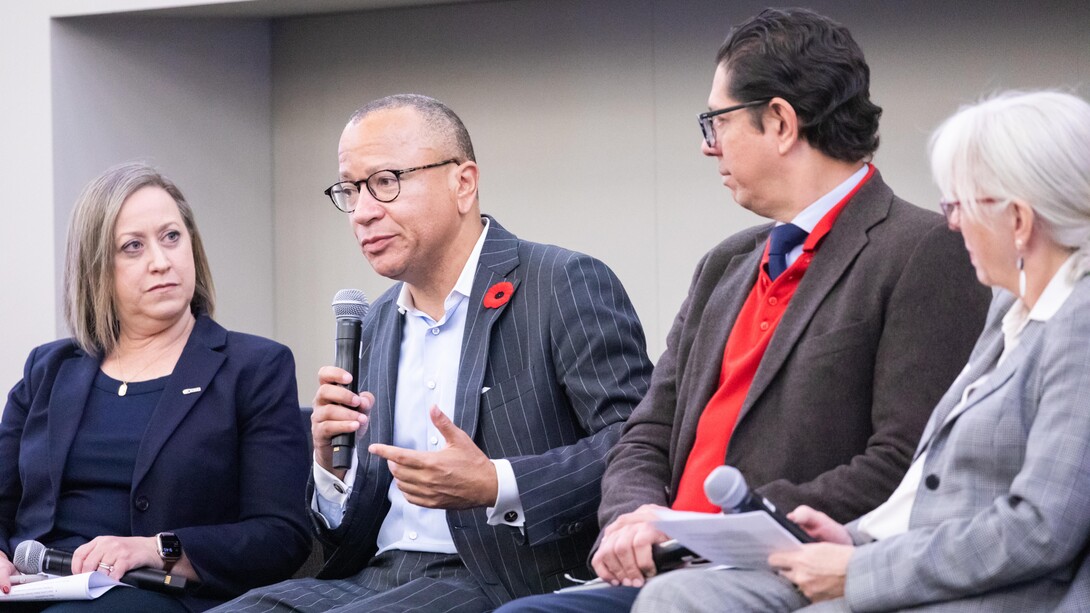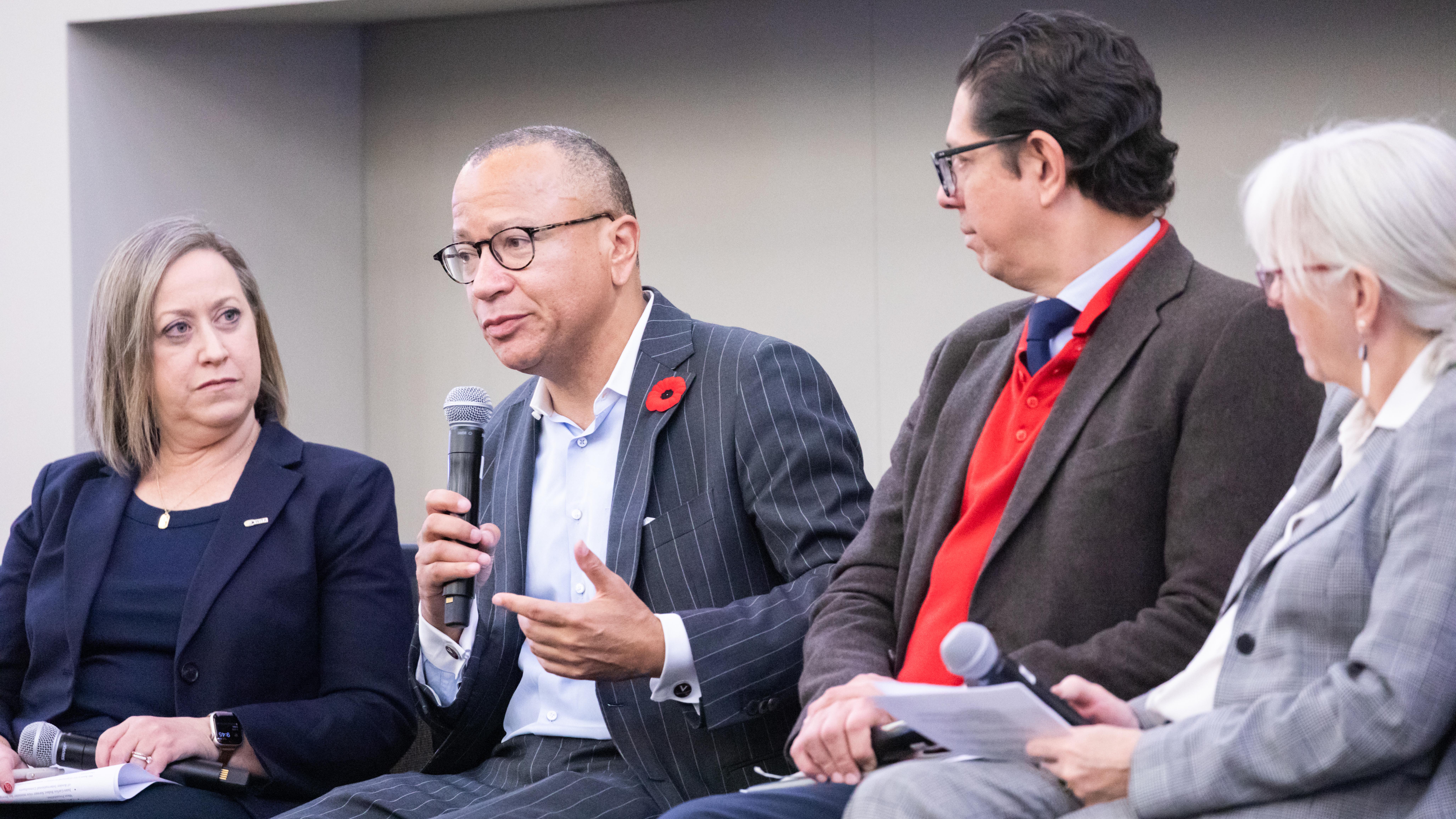
Threats to impose high across-the-board U.S. tariffs risk major retaliation against the nation’s agricultural exports, speakers said during an Oct. 29 symposium hosted by the Clayton Yeutter Institute of International Trade and Finance at Nebraska Innovation Campus.
Once a trade war begins, the ag sector is usually the No. 1 target for punitive action, said Edward Alden, a trade specialist from Western Washington University and a senior fellow at the Council of Foreign Relations, who delivered the keynote remarks. During the 2018-19 trade fight with China, the federal government spent $28 billion to compensate U.S. farmers for trade losses.
The Yeutter Institute holds this biennial symposium to bring these critical discussions to Nebraska, bringing together voices from ag, experts across the nation and trading partners around the world to address key issues in international trade.
This year's symposium, titled “Opportunities for Leadership in the Global Trading System,” featured panel discussions covering a wide range of topics, including current divisions over U.S. trade policy, the prospective renegotiation of the U.S. Canada Mexico Agreement, and complications stemming from Congress’ delegation of trade authority to the executive branch.
Trade specialists also discussed efforts to bolster supply chain security, and the incorporation of sustainability requirements in trade agreements.
Jill O'Donnell, the institute’s Haggart-Work director, introduced the gathering, noting the attendance by University of Nebraska–Lincoln students from a variety of majors, including the institute’s cohort of student fellows.
In a discussion of the upcoming six-year review of the USMCA, a panel including trade experts from Canada and Mexico said their governments privately expect a protracted renegotiation rather than a cursory review.
An ongoing matter of dispute is whether Mexico will become a backdoor way for China to export cars to the U.S. and get around trade barriers. Juan Carlos Baker, a former vice minister for foreign trade for Mexico, said China has no car manufacturing facilities in Mexico. It remains plausible, though, that China might try that strategy in the future, said Sharon Bomer Lauritsen, a former assistant U.S. trade representative.
Prospects for increased trade frictions from higher U.S. tariffs come at a time when the ag sector faces a range of trade uncertainties. Overseas sales account for about 30% of annual receipts for Nebraska agriculture. Yet, U.S. corn and soybean exports to China have fallen significantly in recent years while Brazil’s ag exports have seen a major increase. At the same time, the Mexican government is threatening to terminate imports of GMO corn from the U.S., which would deal a major blow to Nebraska corn.
Mark McHargue, president of the Nebraska Farm Bureau, was in the audience at the symposium and during a Q&A session noted that the U.S. ag sector overall is now experiencing annual trade deficits. That’s a “very concerning” reversal after decades of annual ag-sector surpluses, signaling the need for greater market openings overseas, said McHargue, who chairs the American Farm Bureau Federation’s trade committee.
“A lot of other countries are making major trade deals, and we are not,” he told a panel. He asked if small, country-to-country trade agreements can lead the way to multi-country trade agreements to boost market access.
The situation in the United Kingdom provides a lesson, said Amy Porges, former head of enforcement for the U.S. Trade Representative. After leaving the European Union through the Brexit initiative, the UK has struggled to use small agreements to reconnect trade ties.
Academic analysis has shown that county-to-country agreements can benefit individual economic sectors, especially highly regulated sectors such as food exports, said Kathleen Claussen, a Georgetown University law professor.
It’s hard to see how the U.S. could completely make up the major decrease in U.S. ag exports to China through deals with smaller countries, trade specialist Warren Maruyama said in a later panel discussion. Maruyama is a former general counsel for the Office of the U.S. Trade Representative and worked for two decades with Clayton Yeutter, the Eustis, Nebraska, native for whom the institute is named. Yeutter served as U.S. trade representative and U.S. agriculture secretary and earned three degrees from the University of Nebraska–Lincoln.
During a discussion about incorporating sustainability requirements into trade agreements, McHargue addressed a panel and pointed to the debate in Europe as the EU struggles to decide on environmental sustainability requirements amid pushback from the ag sector.
“It’s important that agriculture is at the table in these conversations as we move forward,” McHargue said.
Katrin Kuhlmann, a Georgetown University law professor, supports sustainability requirements but agreed that ag producers must be part of the policy conversation.
“Farmers are the ones who understand sustainability best,” she said.
In his keynote address, Alden said proposed high across-the-board U.S. tariffs would be particularly harmful by raising the costs of inputs for U.S. companies, especially in manufacturing.
He called for a new consensus focusing on basic principles: pursue market openings and barrier reductions to expand economic opportunity. When trade restrictions are employed, use the least disruptive approach. When appropriate, incorporate other considerations, such as labor standards and national security, into trade decisions.
Such a practical approach is needed, he said, at this “moment of trying to manage, preserve and, if possible, expand the gains from trade.”








